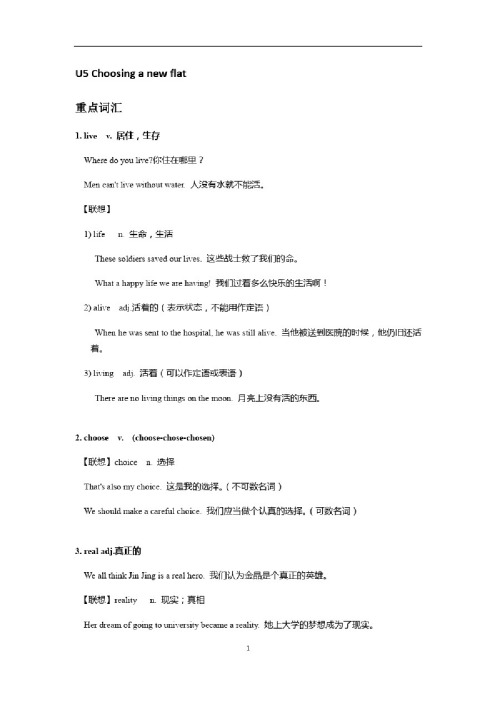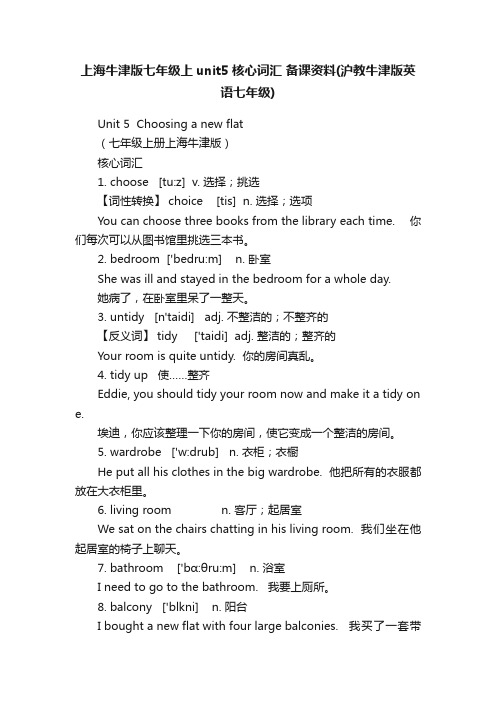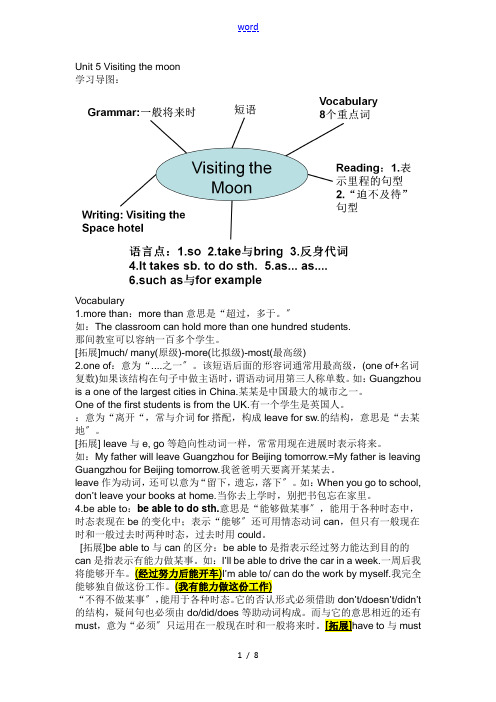牛津上海版七年级英语上册Unit5知识点讲义
上海牛津版 七年级上册 英语unit5语法

上海牛津版七年级上册英语unit5语法:一般将来时一、知识点Unit5课文句子翻译:1、Tomorrow I’ll be one of the first students to travel into space.2、The spaceship will leave the earth at9a.m.3、So it’ll take us about four days to get there.4、So we’ll all be able to float around in the spaceship.5、We’ll have tie ourselves to our beds so that we won’t float away in our sleep.6、Without gravity,our bodies may get weak,so we’ll have to do exercises every day.7、When we arrive,I’m going to walk on the moon.Unit5语法:一般将来时一、概念:表示将要发生的动作或存在的状态及打算、计划或准备做某事。
句中一般有以下时间状语:tomorrow,next day(week,month,year…),soon,the day after tomorrow(后天)等。
二、基本结构:分为两种:1、will+do.肯定句:主语+will+动词原形+其他Peter will go to Nanning next week.否定句:主语+won’t(will not的缩写)+动词原形+其他Peter won’t go to Nanning next week.一般疑问句:will+主语+动词原形+其他?Will Peter go to Nanning next week?肯定回答:Yes,he will.否定回答:No,he won’t.练习:1、He________(come)back in three days.否定句:一般疑问句:肯定回答:否定回答:2、They________(come)back tomorrow.否定句:一般疑问句:肯定回答:否定回答:2、be going to+do肯定句:主语+am/is/are going to+动词原形+其他Peter is going to go to Nanning next week.They are going to go to Nanning next week.I am going to go to Nanning next week.否定句:主语+am/is/are not going to+动词原形+其他Peter isn’t going to go to Nanning next week.They aren’t going to go to Nanning next week.I am not going to go to Nanning next week.一般疑问句:Am/Is/Are+主语+going to+动词原形+其他?Is Peter going to go to Nanning next week?Are they going to go to Nanning next week?Are you going to go to Nanning next week?肯定回答:Yes,he is.否定回答:No,he isn’t.注意:一般疑问句中,be或will提到句首,some改为any,and改为or,第一二人称互换。
沪教牛津版七年级英语unit5visitingthemoon知识讲解

沪教牛津版七年级英语unit5visitingthemoon知识讲解UNIT 5Visiting the MoonⅠ重点单词diary 日记复数:diaries leave 离开,剩下,留下able adj. 能;能够space 太空,不可数spaceship 宇宙飞船spacesuit 宇航服nervous adj.紧张的gravity 重力float v.漂浮ourselves 我们自己的without 缺乏,没有tie v.捆;系;绑tied, tied, tying breathe 呼吸if 如果camera 相机work v. 运转;运行garden 花园rock 岩石postcard n.明信片machine 机器return 不及物动词,回来,返回=come back 及物动词,归还=give back weak 虚弱的,无力的he is weak in English.Ⅱ重点短语leave for 动身去某地more than 超过,多余more···than 比···更be able to会,能have to 不得不so that 以便take photos拍照as ···as one can 尽某人所能as soon as possible 尽可能快地that is 也就是说such as例如at the moment 现在,此刻(可用于现在时和过去时)III常考句型1.How far ···?2.···so that ··3.I’m going to···4.That’s a good idea.IV详细讲解1.It’ll take us to the Moon.(page59)它将把我们带到月球。
初中英语牛津上海七年级上册Unit5Choosinganewflat知识点及语法点讲解

U5Choosing a new flat重点词汇1-live v.居住,生存Where do you你住在哪里?Men cant live\nthout water人没有水就不能活。
【联想】1)life n生命,生活These soldiers sa\,ed our lives.这些战士救了我们的命<>What a happy life we are having!我们过看多么快乐的生活•啊!2)alive adj.活看的(表示状态,不能用作定语)When he was sent to the hospital,he was still aEx e.当他被送到医院的时候t他仍旧还活看。
3)living adj.活看(可以作定语或表语)There are no lixing things on the moon月亮上没有活的东酉。
2.choose v.(choose-chose-chosen)【联想】choice n.选择That's also my choice这是我的选择。
(不可数名词)We should make a careful choice.我们应当做个认真的选择。
(可数名词)3.real adj.真正的We all think Jin Jmg is a real hero.我们认为金晶是个真正的英雄©【联想】reality n现实;真相Her dream of going to university became a reality她上大学的梦想成为了现实。
plete1)v.秘The workers haven't completed the house yet.工人们还没有造好那所房子。
2)adj完全的,芫He's a complete stranger to me.我和他完全不认识。
John has amx ed so oiir class is complete约翰已经到了,因此我们班都到齐了。
沪教牛津初一上册Unit5语法复习

Unit5 一般将来时态一、含义:表示将要发生的动作或存在的状态及打算、计划或准备做某事。
如:I am going to fly to Shanghai next week. They will go shopping tomorrow morning.二、时间标志词:1、tomorrow, the day after tomorrow;2、next系列:next day(week, month, year );3、in/after+一段时间,“在...之后”:in three days, in a few days几天后;4、soon,this evening,tonight,from now on 等三、基本句型结构:①主语+will/shall+动词原形+其他②主语+be going to+动词原形+其他在“shall+动词原形”结构中,主语仅限于第一人称,变一般疑问句,人称不变。
e.g.: We shall go home next week.下周我们要回家。
Shall we go home next week?下周我们要回家吗?四、“be going to+动原”和“be about to” 构成的一般将来时态e.g. We are going to have a meeting tomorrow. 我们打算明天开会e.g. We are about to graduate from high school this summer.今年夏天我们将会从高中毕业五、“will或shall的区别”“will或shall+动原” 这一形式,表示将来发生的事情或状态;“will/shall+主语+动原?”在疑问句中用于征求对方的意见或表示客气的邀请。
Eg:1.Tomorrow will be sunny.明天天气将会晴朗2.Shall we go to the zoo now? 我们现在去公园,好么?3.Will you pass me the salt,please? 麻烦您递给我盐,好么?六、“will+v.”与“be going to+v.”的区别be going to与will两者都可表示将要发生的事、将要去做某事,但它们有如下几点区别:1. be going to 表示近期、眼下就要发生的事情,will 表示的将来时间则较远一些,e.g.: He is going to write a letter tonight. He will write a book one day.2. be going to 表示根据主观判断将来肯定发生的事情,will表示客观上将来势必发生的事情。
牛津英语七年级上册Unit5详细知识点及讲解例句.

7A Unit5知识点1. Let sb do Let’s celebrate.2. celebrate 动词celebration 可数名词3. What/ who + 三单What is (be in the bag?----There are five books.4. have a guess have a try guessing games 猜谜游戏5. be interested in doing 对…感兴趣She is interested in __________(read. The story is ___________(interest.6. I’d like …= I would like would like=want + to do sth.7. dress +人给某人穿衣服dress up 乔装打扮Put on 穿的动作wear 穿的状态人+in +衣服She looks nice in the new dress.衣服+on+人The dress looks nice on her.8. How about/ What about + doing.W hy not+ do Why don’t you +do Would you like+to do9. different +名词复数different kinds of different countries10. 各个节日的拼写注意:Christmas Dragon Boat Festival Halloween11. present=gift 礼物12. on +具体时间on that day on my birthday on a sunny morning13. enjoy the full moon full 满的,饱的be full of 装满…14. thanks for doing sth. 介词:in on of about at for 等+ doing15. tell sb about sth Tell sb to do/ not to do sth. His parents tell him _____(not run too fast.16. We play some games at Christmas. What do you do at Christmas?17. have lots of fun + doing have fun = have a good time=enjoy oneself +doing玩的开心18. paint + 名词+颜色paint our faces blue19. make orange lanterns= make lanterns out of oranges=use oranges to make lanterns20. it is wonderful +to do sth. Be +形容词+ to do21. p lay games with sb. 22. knock on/ at one’s door23. play tricks on sb 给某人捣乱24. give sb sth. as a treat = give sb a treat of sth = treat sb. with sth25. what 问内容which 问哪一个who问谁whose问谁的when问时间Where问地点why问原因how问方式how often问频率How many问可数名词多少how much问不可数名词多少how long问多久多长How far 问距离26. watch the lion dance toy bears set/ let off fireworks 27. listen to the radio28. be on holiday 度假I go to different places for holiday.29. seem 似乎+ 形容词He seems unhappy. seem + to do30. at this time of year在每年的这个时候31. get sth. from sb 从某人那里得到某物get sth. ready for sb. 为某人准备某物32. take photos of sth. 拍…的照片注意photo加s。
上海牛津版七年级上unit5核心词汇备课资料(沪教牛津版英语七年级)

上海牛津版七年级上unit5核心词汇备课资料(沪教牛津版英语七年级)Unit 5 Choosing a new flat(七年级上册上海牛津版)核心词汇1. choose [tu:z] v. 选择;挑选【词性转换】 choice [tis] n. 选择;选项You can choose three books from the library each time. 你们每次可以从图书馆里挑选三本书。
2. bedroom ['bedru:m] n. 卧室She was ill and stayed in the bedroom for a whole day.她病了,在卧室里呆了一整天。
3. untidy [n'taidi] adj. 不整洁的;不整齐的【反义词】 tidy ['taidi] adj. 整洁的;整齐的Your room is quite untidy. 你的房间真乱。
4. tidy up 使……整齐Eddie, you should tidy your room now and make it a tidy on e.埃迪,你应该整理一下你的房间,使它变成一个整洁的房间。
5. wardrobe ['w:drub] n. 衣柜;衣橱He put all his clothes in the big wardrobe. 他把所有的衣服都放在大衣柜里。
6. living room n. 客厅;起居室We sat on the chairs chatting in his living room. 我们坐在他起居室的椅子上聊天。
7. bathroom ['bɑ:θru:m] n. 浴室I need to go to the bathroom. 我要上厕所。
8. balcony ['blkni] n. 阳台I bought a new flat with four large balconies. 我买了一套带有四个阳台的公寓。
七年级上英语知识梳理(上海牛津版)U5-U6

Unit 5 Visiting the moon学习导图:Vocabulary1.more than:more than意思是“超过,多于。
〞如:The classroom can hold more than one hundred students.那间教室可以容纳一百多个学生。
[拓展]much/ many(原级)-more(比拟级)-most(最高级)2.one of:意为“....之一〞。
该短语后面的形容词通常用最高级,(one of+名词复数)如果该结构在句子中做主语时,谓语动词用第三人称单数。
如:Guangzhou is a one of the largest cities in China.某某是中国最大的城市之一。
One of the first students is from the UK.有一个学生是英国人。
:意为“离开“,常与介词for搭配,构成leave for sw.的结构,意思是“去某地〞。
[拓展] leave与e, go等趋向性动词一样,常常用现在进展时表示将来。
如:My father will leave Guangzhou for Beijing tomorrow.=My father is leaving Guangzhou for Beijing tomorrow.我爸爸明天要离开某某去。
leave作为动词,还可以意为“留下,遗忘,落下〞。
如:When you go to school, don’t leave your books at home.当你去上学时,别把书包忘在家里。
4.be able to:be able to do sth.意思是“能够做某事〞,能用于各种时态中,时态表现在be的变化中;表示“能够〞还可用情态动词can,但只有一般现在时和一般过去时两种时态,过去时用could。
[拓展]be able to与can的区分:be able to是指表示经过努力能达到目的的can是指表示有能力做某事。
沪教牛津版七年级英语上册课件Unit 5 Getting ready Reading

1 Jerry is the only student to travel into space.
T/F
Tomorrow I’ll be one of the first students to travel
into space.
2 Jerry is very excited about the trip.
• When is Jerry going to travel into space?
He is going to travel into space on 11 October 2053. • Why will Jerry be able to float around in space?
Because there is no gravity in space. • What will Jerry wear on the Moon?
Bill: Certainly. 5 Tony: Will you be (5)able to come to my party tomorrow?
Paul: Sorry, I’m busy.
D Comprehension
D1 Read Jerry’s diary on page 59 and answer the questions below in complete sentences.
take photos
as … as
Skim the diary Decide the main idea of each paragraph.
Paragraph 1
Paragraph 2
Paragraph 3
Jerry talks about his plans for his activities on the Moon.
- 1、下载文档前请自行甄别文档内容的完整性,平台不提供额外的编辑、内容补充、找答案等附加服务。
- 2、"仅部分预览"的文档,不可在线预览部分如存在完整性等问题,可反馈申请退款(可完整预览的文档不适用该条件!)。
- 3、如文档侵犯您的权益,请联系客服反馈,我们会尽快为您处理(人工客服工作时间:9:00-18:30)。
牛津上海版七年级英语上册Unit5知识点讲义知识点梳理eful words and expressions1. Please tidy up your things.➢tidy adj. 整洁的,整齐的v. 使整洁;使整齐tidy up 使……整齐2. My bedroom is too small for all my things.➢too + adj. + for sb. 对某人而言太(怎么样)[e.g.] That T-shirt is too big for her.➢too+adj./adv.+for sb./ sth.to do对某人而言太(怎么样)而不能(怎么样)[e.g.] English is too difficult for me to learnThis question is too difficult for me to answer3. Ben and I are much bigger now.➢much在本句中作副词,修饰比较级bigger,表示“……得多”的意思。
[e.g.] The wind becomes much stronger.此外,much 亦可作形容词,修饰不可数名词[e.g.] much water / milk➢常见的可修饰比较级的词有:much, a little, even, still, far, a lot等。
4. What’s the matter?➢此句常译为“怎么了;发生了什么事啊;有什么问题”。
➢要询问某人有什么麻烦时,可使用:What’s the matter with somebody?同义句型有:What’s wrong(with somebody)?What’s the problem (with somebody)?What’s the matter (with somebody)?注意:在口语中多使用What’s up?5. We’ll look for a bigger flat.➢注意区别:1)look for意为“寻找”,强调“寻找”这一动作。
2)find意为“找到”“发现”,强调“找”的结果。
[e.g.] —Did you find Li Ming yesterday?—No,we looked for him everywhere,but didn't find him.6. I’d like a flat with three big bedroom, a big kitchen, two bathrooms and a balcony.➢本句中的with是“有,带有”的意思,如果对本句中with短语进行划线提问,需用“Which / What kind of….”[e.g.] She is a young lady with beautiful long hair.7. Can I help you?➢与本句可以互换的的句子有:May I help you? / What can I do for you? / Anything I can do for you? 它们都可以理解为“有什么我可以帮忙的吗”,但在不同的场景有不同的含义。
8. The Lis have moved to their new flat in Water Bay.➢the Lis=the Li’s family, 是指”李先生一家”或“姓李的一家”。
➢定冠词the加姓氏复数可以用来表示某一家人。
[e.g.] The Smiths went to France for their holiday last week.9. Where do you want the round table, Mrs. Li?➢本句其实是“Where do you want me to put the round table?” 的缩略提问方式。
10. Put it on the floor between the TV set and the sofa, Please.➢between A and B 是“位于A和B”之间的意思➢注意区别:1) between 多指两者之间。
[e.g.] What's the difference between the two words?2) among 指三者或三者以上的同类事物之间,在或笼统的一群人或一些物之中,表示“在……中间,在……之中”。
[e.g.] The young people lived and worked among the workers.II.Word studyIII. Language explanation1. I also need a table for my computer.➢need sth. for + n. / doing sth. 意为“需要某物来(做某事)”➢这里need作为实义动词,基本使用结构如下:need sth [e.g.] We need a great deal of money nowneed to do sth. [e.g.] What do we need to take for the picnic?构成否定句和疑问句时要借助于助动词do或does或did。
2. I’d like a flat with…➢此句译为我想要一套……的公寓, I’d like sth. = I want sth; I’d like to = I want to 其具体用法可参见六年级英语知识点梳理相关条目。
3. 小结本单元的中的方位介词的用法:➢on表示“在……上面”,有紧靠在某物之上的意思。
➢near表示“靠近; 在……附近”。
➢next to表示“紧靠; 在……隔壁”。
➢opposite表示“在……对面; 与……面对面”。
➢between A and B表示“在A和B之间”的意思。
➢in front of表示“在……前面”, 反义词为behind (在……后面)。
课堂练习I. Fill in the blanks according to the phonetic transcriptions. (5分)1. Lisa wants to have a _________ of her own.2. The post office is just _________ the Science Museum.3. The _________ agency is only five minutes’ walk from my home.4. There are so many different clothes and I don’t know which to _________ .5. I don’t know what’s the _________ with them.II. Choose the best answer.(选择最恰当的答案):(共20分)( ) 1. ____ estate agency will give us advice about how to choose a new flat.A. AB. AnC. /D. At the( ) 2.A terrible earthquake happened in Wenchuan ______ May 12, 2008.A. /B. inC. atD. on( ) 3.We use a cupboard to put ______ inside.A. bowlsB. clothesC. magazinesD. rubbish( ) 4.The Smith have bought ______ for their new flat.A. two furnitureB. two pieces of furnitureC. two wardrobeD. two balconies ( ) 5.I need a bookshelf ______ all my books.A. toB. forC. withD. of( ) 6.I live ______ my school, so I go to school on foot.A. far awayB. far fromC. nearD. near to( ) 7.Shall I put the rug _______ the sofa and the TV set?A. in frontB. nearC. betweenD. next( ) 8.The room is ______ for all the things. We need a bigger room.A. big enoughB. too bigC. small enoughD. too small( ) 9.The old flat has ______ than the new one. It has only one bedroom.A. few roomB. fewer roomsC. less roomD. more rooms ( ) 10.Your classroom is ______ bigger than mine.A. tooB. muchC. moreD. a lot of( ) 11.Let call a ______ company to help us ______ to a new flat.A. removal, moveB. remove, moveC. move, removeD. moving, remove( ) 12.A: What’s ______ with you? B: I have got a headache.A. the wrongB. badC. matterD. the matter( ) 13.About ______ students in this college will be the volunteers of the World Expo.A. three hundredB. hundredC. hundreds ofD. hundreds( ) 14.Who can tell me the differences ______ the Lis’ new flat ______ the old one?A. between, andB. among, andC. between, withD. among, with( ) 15.A: What kind of flat _____ you _____? B: I’d like a bigger flat in the suburbsA. do, likeB. would, wantC. do, loveD. would, like( ) 16.A: Where do you ______ the dinner table? B: Put it opposite the TV, please.A. putB. needC. wantD. buy( ) 17.Simon, you ______ do your homework today. Leave it for tomorrow.A. needn’t toB. not need toC. don’t needD.don’t need to( ) 18. Did you ______ my wa tch? I can’t _______ it.A. look; findB. look; find outC. see; look forD. see; find( ) 19.I like ______ at the beach.A. walkingB.walksC. walkD. walked( ) 20. A: ______ you like a cup of orange juice?B: ______.A. Will, No, thanksB. Do, Yes, I likeC. Do, No, I don’tD. Would, Yes, pleaseIII. Complete the following passage with the words in the box. Each word can only be used once. (5分)Chris Tompkins and Steven Butler look the same. They are twins. But they did not 1. _________ together like most brothers. They did not know each other. They grew up in 2. _________ families. Now they are 30 years old. Chris is a doctor. Last year he went to a big meeting in Chicago. A man at the meeting looked exactly like Chris! Steven was at the meeting! He is 3. _________ a doctor. Chris and Steven are both doctors!Now Chris and Steven live in the same town. They live very near each other. In fact their houses are next door to each other. They are not always at home. They 4. _________ go to meetings in other towns. So they have time to 5. _________ together. And they get to know each other. And they get on well with each other.IV. Complete the sentences with the given words in their proper forms. (用括号中所给单词的适当形式完成下列句子):(共5分)1. I need more ___________(shelf)for books in my room .2. This flat is ___________ (love).3. For the ___________ time he became worried about the future because of the global financial crisis (金融危机). (one)4. This shirt is much ___________(expensive) than that one.5. The World Expo needs many ____________ (help) to be the volunteersV. Rewrite the following sentences as required.(根据所给要求,改写下列句子。
